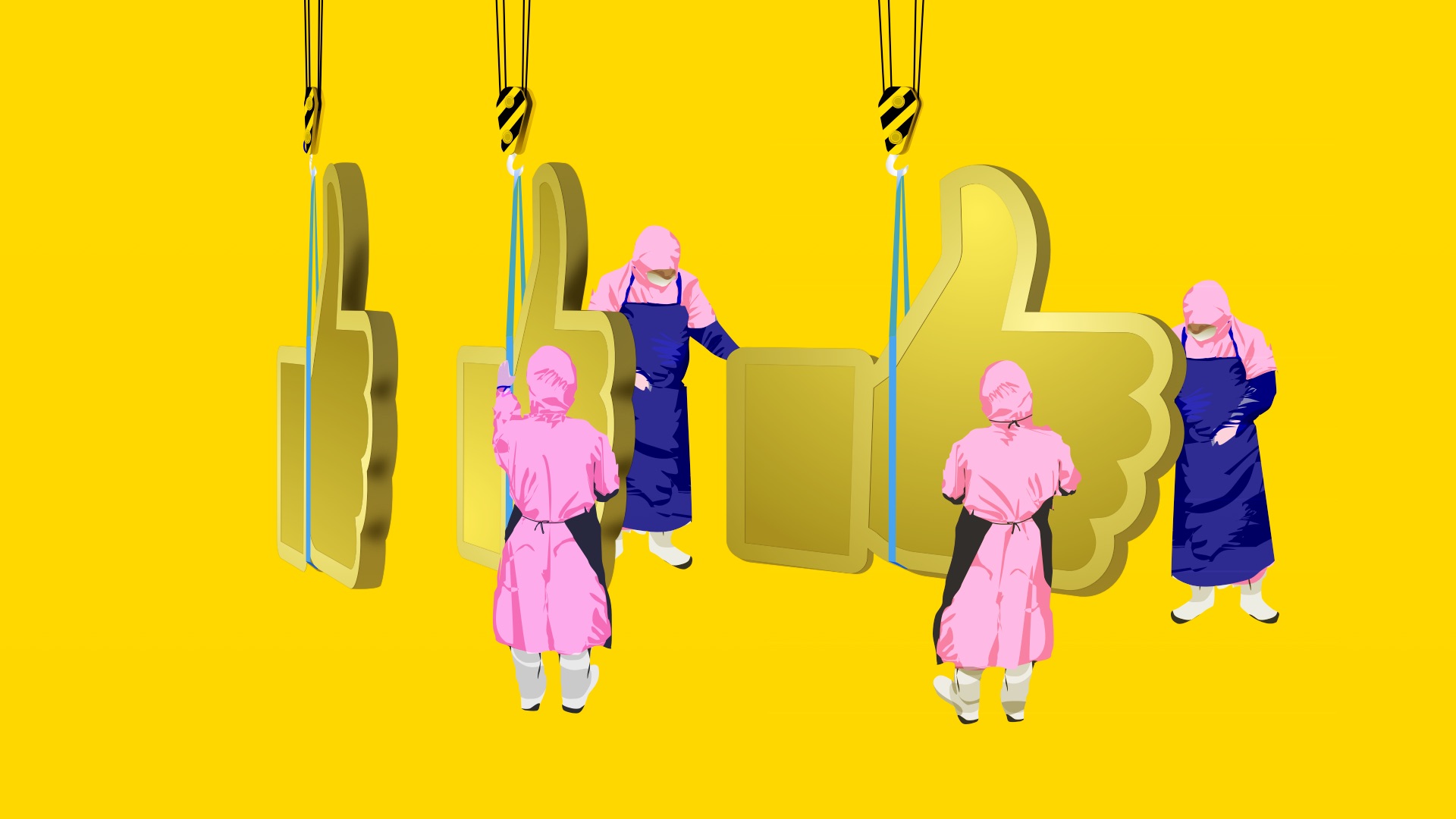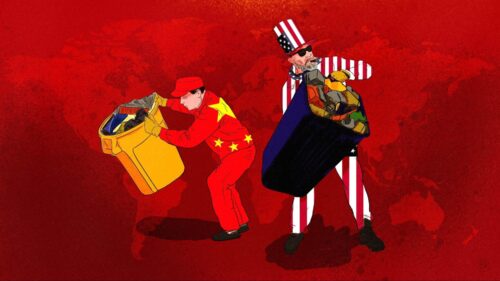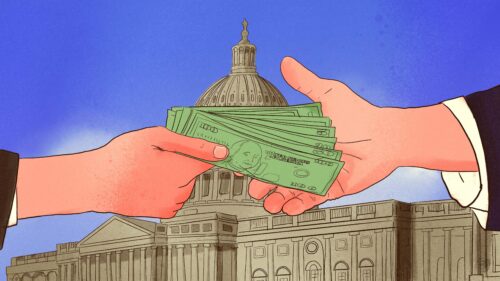Do Chinese people support their government? Here’s why it’s hard to tell
A recent Harvard Ash Center study found that Chinese people are generally happier with their government now than ever. But there are at least three reasons why China’s public satisfaction numbers may not reflect performance.

In late July, U.S. Secretary of State Mike Pompeo said in a speech that the Chinese Communist Party rules over an “oppressed” people. “The CCP fears the Chinese people’s honest opinions more than any foe,” he said. While the Communist Party presents itself as a spokesperson for the Chinese people, Pompeo was now accusing them of holding their own people hostage. But a recent study released by the Harvard Ash Center portrayed a different reality. In a decade-long survey of more than 31,000 Chinese citizens from 2003 to 2016, researchers Edward Cunningham, Tony Saich, and Jessie Turiel found that “Chinese citizen satisfaction with government has increased virtually across the board.”
The study makes a number of contributions to our understanding of China. First, it offers a glimpse into an opaque and long-speculated domain of study — Chinese public opinion — which has suffered due to a lack of long-term, publicly available survey data from China. (According to the report, the surveys were carried out by a “reputable domestic Chinese polling firm,” but no further elaboration was given.) Second, it dispels a myth that the Communist Party has faced anything close to a crisis of legitimacy since the student uprisings of 1989. Finally, it provides a granular picture of public satisfaction at varying levels of the Chinese government. The study found, for instance, that public satisfaction levels increase as you go higher up the government chain of command. In light of these findings, Pompeo’s depiction of a Chinese government sitting on a volcano of oppressed and resentful people is misguided and detrimental to future U.S.-China relations.
But since its release, the study has been cited by Chinese state media such as China Daily and CGTN as a justification for China’s governance model. China’s foreign ministry spokesperson Huá Chūnyíng 华春莹 posted the Harvard study on Twitter along with a vindictive remark: “How about Washington?” China watchers have also been swept up. When David Dodwell, a director of a Hong Kong think tank, cited the study to criticize Pompeo’s stance on China, his words were pull-quoted on Hua Chunying’s Twitter account.
That the study has caught the attention of Chinese officials and state media should be expected. Since Xí Jìnpíng 习近平 came to power in 2012, the Communist Party has advanced a specific narrative of China’s rise. In this story, the CCP has retained the mass support of the people through innovative and effective governance — governance that has brought millions out of poverty, assimilated the country back into the folds of great powers, and successfully protected its offshore territorial claims. The Harvard study, on its face, cleanly supports that tale.
Yet it is one thing to claim that the Chinese people are more satisfied with their government — this much is entirely plausible — it is another thing entirely to claim that Beijing’s governance deserves our moral adoration or respect. The latter is a normative claim that draws a specious link between public satisfaction rates and the legitimacy of the CCP’s governance style. It implies that positive attitudes in China are indicative of a well-executed government; a government, in other words, that has won the support of the people through good policymaking (such as improvements to healthcare, infrastructure, welfare, and education) rather than questionable means.
Good policymaking seems to be a bigger source of satisfaction at lower levels of government. The researchers suggest that people’s satisfaction rates responded most clearly to “changes in their material well-being,” suggesting that policies with immediate impact can play a big role in people’s opinions of their governments. But this leaves open the question of how we should interpret public satisfaction at higher levels, where targeted welfare policies are replaced by large-scale economic and social policies governing anything from trade regulations to online censorship. According to the survey, these latter policies received the highest approval among Chinese (93 percent in 2016). But does this percentage truly reflect good leadership?
If so, the implications are staggering. Approval ratings for U.S. presidents across America’s entire history average around 55 percent and have rarely crossed the 60 percent threshold. Approval rates for UK Prime Minister Boris Johnson stagnated around 50 percent last year, and Germany’s Angela Merkel, whose ratings skyrocketed following her handling of the coronavirus pandemic, still obtained only 70 percent support. That the gulf of approval between Western and Chinese leaders could reflect so wide a difference in performance is hard to believe given the vicissitudes of public opinion. Rather, the gap seems to point, in large part, to differences in the political system and the kinds of information environments they create, or curate.
There are at least three reasons why China’s public satisfaction numbers may not reflect performance. First, and most obviously, the Chinese Communist Party actively shapes public opinion. Strict online censorship rules and the prohibition of foreign media companies allow the Party to control information flows. Although this does not imply that citizens are forced into anything, this all but guarantees that news about the government’s actions is heavily sanitized. For example, during the Wenzhou train collision in 2011, where 40 people were killed, the Communist Party prohibited any coverage of the accident.
The Party not only erases negative news coverage, but actively manufactures positive coverage by hiring spin doctors to promote them online. In 2013, Lǔ Wěi 鲁炜, the former vice mayor of Beijing and the former deputy head of the propaganda department, trained over 2 million online propaganda workers to inject “positive energy” (zheng neng liang) into the opinions of the government. The citizens surveyed in the Harvard study were most likely honest about their support. Nonetheless, this does not confer any meaningful legitimacy if the evidentiary basis for their opinions was heavily doctored.
Second, positive support for the Communist Party, in the form of nationalism, is actively encouraged by an elaborate system of patriotic education and social surveillance. Since the 1990s, the Party has been actively engaged in a patriotic education campaign meant to instill nationalist views into Chinese youths. History textbooks overemphasize foreign aggression during what is now commonly known as the “century of humiliation.” This history presents the Communist Party as the sole defender of China’s national interests since their victory in the Chinese Civil War in 1949. More recently, China’s social surveillance apparatus — which began trials in 2009 and will be fully operational this year — also contributes to a culture of acquiescence and complicity. The social credit system, as it is now called, exacts punishments for all kinds of quotidian behaviors such as littering. The sense that one is constantly being monitored can acculturate citizens into state-sanctioned behaviors and beliefs.
A third possible reason for the upward trend in satisfaction levels is an increase in political apathy. On this view, the increase in public satisfaction rates found in the study (which are all averages) are not so much a result of gains in positive opinion, but losses in negative ones — the critics have either left or tuned out. Unlike trends in Western democracies, China’s political system has, for decades, discouraged popular input at higher levels of government. For example, they have continuously withheld competitive elections for top officials and, in 2018, President Xi removed term limits for the highest office. Chinese citizens have little to no choice in their political leaders. Sociologists have found that engagement in politics comes from habits formed from years of participation. Conversely, then, a system without adequate channels for participation can lead to disengagement and apathy.
In short, dissatisfaction is not always a sign of bad performance; it is also a mark of privilege. In Western cultures, adults enjoy more freedom in their choice of marital partners relative to their Eastern counterparts, where arranged marriages are more common. Yet Western adults have higher divorce rates, suggesting that they are less satisfied with their partners than Eastern adults. Just as we do not take such findings as evidence for the superiority of arranged marriages, we should not take higher satisfaction rates as evidence for the success of China’s governance model. When we lack possible choices, our expectations change, and we often lose the desire for a better outcome.
Mencius, one of Confucius’ famous disciples, once declared that rulers draw their support from heaven, but heaven “hears with the ears” and “sees with the eyes” of the people. It was a recognition that the source of legitimacy in politics ultimately lies with the ruler’s subjects. As U.S.-China relations approach a nadir, both countries have accused the other of failing to meet this ancient criterion. “Show us honesty and courage,” wrote Hua Chunying in another attack against Pompeo, and “listen to your people.” Yet people’s eyes and ears are not perfect: they are easily misled by political leaders and their machinations. Although the Harvard survey breaks some common misperceptions about China, it is far from a positive performance review of the CCP. To make it so, China should try ensuring that their citizens see and hear the unvarnished truth.






